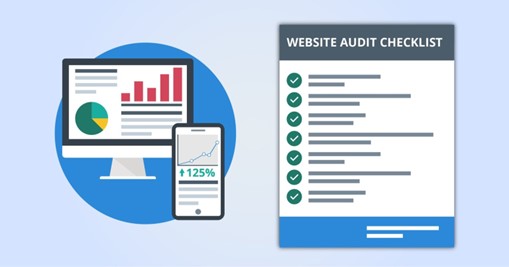
Have you recently noticed that your website traffic is declining exponentially? Or your conversion rate is severely affected? If that rings a bell, it may be the high time to audit your website.
This is a metaverse era, and everything is online, due to which website's relevance has surged dramatically. Your website is at the forefront of your online presence. Indeed, research shows that a staggering 75% of visitors judge a company's credibility through the lens of its website.
Therefore, experts suggest that you audit your website regularly to raise the user experience of your audience. This is particularly important as visitors usually like or dislike your website in 0.05 seconds.
That got quite astounding, right? Don't worry. We will not leave you guessing on the surface.
This article will dive deep into a website audit, its relation with SEO, its features and why you should audit your website. Let's dive in!

So, we've already mentioned the term website audit more than a couple of times, but wait? What exactly is it? Let's try to understand it with the help of an example.
Suppose you call an electrician for the service. He wouldn't cut a single wire before analyzing the broken light switch. In the same way, a digital marketer just refrains from tweaking content, metadata and the architecture of the site without performing a thorough website audit.
A well-conducted website audit helps marketers identify the real potential problems before they proceed to resolve and rectify issues.
In particular, a site audit assists digital marketers in locating faults on the site, spotting potential opportunities, analyzing the advantages and disadvantages of competitors, and researching keywords. Hence, it also aids in devising an action plan that is feasible and a priority.
Each website is unique, with its challenges that require attention and solutions. Consequently, various types of audits are tailored to address specific aspects of a website.
Search engine optimization is the heart and soul of your digital marketing campaign and the overall online presence of your business. Similarly, no website audit is complete with an SEO audit.
The practice of assessing the extent to which your website is search engine optimized serves as an SEO audit. It detects errors that could hinder your website's search engine ranking as well as chances to increase your online presence.
These are the few areas that an SEO audit typically encompasses:
• On-Page Search Engine Optimization
It serves as the checklist of your website.
A website audit is like a thorough check-up of your website. It helps find problems with how your site performs, how it's organized, and what's on it. Why is it important? Well, let's break it down:
A website audit addresses technical and content troubles that might affect your site. Things like broken links, slow-loading pages, and other tech hiccups can frustrate users.
Think of website audits as a booster for your website's search engine game. They uncover ways to improve your site's rank on Google by tweaking things like keywords, meta tags, and the quality of your content.
A website audit tells you if your site is easy to use. It looks at how easy it is to get around, how it looks on phones, and whether the design makes users happy. Check out our Web design services to build engaging websites for yourself.
Audits also look out for security issues and if your site follows important rules and laws, like the GDPR for data privacy.
Your site's speed is a big deal, as 47% of users have an expectation that the loading time for a typical website should not exceed 2 seconds. Audits measure how fast your pages load and speed can affect both user happiness and how Google ranks your site.
Good content is king! Audits judge how good and relevant your website's content is. This can affect how much people like your site and where you show up in search results. It is important as users devote an average of 5.59 seconds to peruse the written content of a website.
Website audits also compare your site to others in your field. This can help you see where you're doing well and where you can do even better.
A staggering 88% of online consumers are inclined to steer clear of revisiting a website following a negative experience. Audits help find ways to boost how many visitors turn into customers. Things like making buttons and forms more effective can make a big difference.
With so many folks using smartphones, it's vital that your site works well on them, as a whopping 85% of visitors think that a website should be as good on mobile as on desktop. Audits point out where you can make improvements.
Audits often dive into your website's data, showing how users behave, where they come from, and how well you turn visitors into customers. This info guides future improvements.
Audits ensure your website is on the same page as your business goals. If they're not, audits suggest ways to get back on track.
A website audit involves a thorough evaluation of various aspects of a website to assess its performance and identify areas for improvement. The features of a website audit encompass a range of factors and considerations, and they are essential for maintaining a healthy and effective online presence. Here are the key features of a website audit:

This aspect of the audit examines the technical elements of a website that affect its search engine ranking and overall performance. It includes assessing factors like website speed, mobile-friendliness, URL structure, sitemaps, and security measures.
On-page SEO focuses on optimizing individual web pages for search engines. The audit checks elements such as keyword usage, title tags, meta descriptions, header tags, and internal linking to ensure they are optimized for SEO.
A content audit evaluates the quality, relevance, and effectiveness of the website's content. It involves identifying duplicate content and assessing keyword usage, readability, and user engagement metrics.
UX is crucial for retaining website visitors. This part of the audit assesses aspects like website navigation, mobile responsiveness, call-to-action elements, and overall usability to enhance the user experience.
Backlinks play a significant role in SEO. The audit reviews the website's backlink profile, assessing the quality and relevance of inbound links, identifying toxic backlinks, and evaluating anchor text diversity.
Social media is an integral part of online marketing. The audit checks how well the website integrates with social media platforms, measures social sharing and engagement, and ensures consistent branding.
The audit examines the implementation of analytics tools like Google Analytics and Google Tag Manager. It analyzes key performance metrics, sets up goals and event tracking, and provides insights for data-driven improvements.
Ensuring that the website complies with accessibility standards (e.g., WCAG) and legal requirements (e.g., GDPR, CCPA) is essential. The audit assesses whether the website adheres to these regulations.
By comparing your website to competitors, the audit identifies strengths, weaknesses, and opportunities in your industry. This helps in shaping strategies for improvement and staying competitive.
The audit culminates in a detailed report with findings and actionable recommendations. It prioritizes issues and suggests strategies for enhancing the website's performance and achieving business goals.
And that's a wrap. Think of these audits as a check-up for your online presence. They help you uncover and fix issues, supercharge your SEO game, and ensure your site is both user-friendly and secure. Additionally, they delve into the nitty-gritty data, help you stay competitive, and make sure your site lines up with your business goals.
It's all about giving your digital storefront a little tender loving care to keep it cruising smoothly in this metaverse era. So, if you've noticed a drop in your website traffic or just want to stay ahead of the game, a website audit could be your secret weapon for success. No need to procrastinate; give your website the attention it deserves and see your online presence shine!
Made with in 25 cities around the world